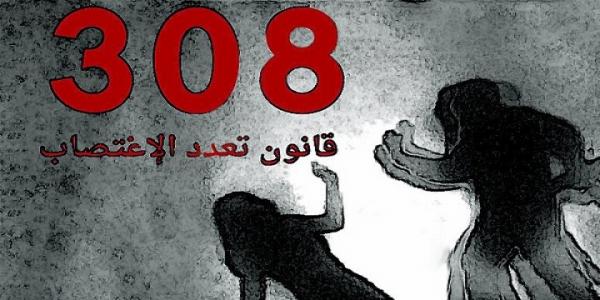by Rana Husseini – AMMAN — Lawyers, journalists, and Muslim and Christian scholars have called for eliminating Article 308 of the Penal Code and adopting better psychological and legal measures to protect victims of rape and molestation in Jordan.
Under the article, rapists are spared from punishment or legal prosecution if they marry their victims and stay with them for five years.
The call came during a panel discussion titled “The Marriage of the Culprits of Rape to their Victims” organised by the International Women’s Forum’s (IWF) Jordan Chapter earlier this week.
Lawyer Taghreed Dughme, who conducted a one-and-a-half-year investigative report on Article 308, spoke about her experience at length.
“I had a hard time finding figures about the issue at certain institutions, and was unable to find one brave woman to stand behind the camera and tell her story,” added Dughme, who heads the investigative journalism department at Al Balad Radio.
But she said she managed to get some figures from the Criminal Court, indicating that there were 300 rape and 1,000 molestation cases reported in Jordan in the past four years.
However, Dughme said she was unable to find information at local governmental organisations and the relevant public institutions on cases where convicted rapists divorced their victims before the required five-year period.
“This is a real problem and indicates that there is no follow-up on this matter,” she noted.
According to a recent study conducted by the National Council for Family Affairs, 55.8 per cent of Jordanians back Article 308 and perceive it as a win-win situation. The council did not provide details on the polled sample.
MP Wafaa Bani Mustafa, has (Jerash, 1st District), who has served in two consecutive parliaments, said Article 308 “basically allows the continuation of rape within the family and must be eliminated”.
“Women end up taking the blame for a crime that was committed against them. If they do not marry their rapists, they are killed to cleanse the family’s honour,” Bani Mustafa noted.
On the other hand, the deputy added, “I have never heard of any case where the state imprisoned a man who divorced a woman he raped before the five-year period.”
At a local conference in October, judges and legal experts revealed that in the 99 cases of suspected rape reported until the end of June this year, 95 per cent of the perpetrators managed to avoid punishment by marrying their victims.
Lawyer Ahmad Najdawi, who has been in practice since 1971 and served as a judge on the Criminal Court, pointed out that Article 308 comes from the French Napoleonic Penal Code.
“Obviously, Article 308 and many other articles in the Jordanian Penal Code are derived from the Napoleonic Penal Code and do not relate to our Islamic Sharia that calls for protecting and raising the standards of women,” Najdawi explained.
“This article should be scrapped or amended, because basically it represents a reward for the rapist,” he said.
Yacoub Far, who has been a practising lawyer since 1973 and has a special interest in personal status laws pertaining to Christians in Jordan, agreed.
“This kind of marriage is based on a wrong premise, since the aim of it is to end the punishment,” Far said.
Sharia (Islamic law) professor at the University of Jordan Abdulruhman Kilani said allowing sex offenders to marry their victims contradicts the main purpose of marriage, which is to form stable families.“Such marriages are unjust and against Sharia, which calls for building a family without being forced into marriage,” Kilani said.
“Article 308 is a tool to encourage rape, because it imposes marriage afterwards,” he stressed.
Arab Reporters for Investigative Journalism (ARIJ) Executive Director Rana Sabbagh, the moderator of the panel, said the local media is almost absent in the coverage of social issues.
“We have a handful of journalists, mostly supported and trained by ARIJ, who are interested in social and legal issues and are trying to make a difference in our society,” she said.
Unfortunately, the majority of the local media and its columnists are “busy with neighbouring conflicts and wars and forget about important issues back home”, added Sabbagh, a veteran journalist and former chief editor of The Jordan Times.
Turning to Article 308, she said the Sharia position in this regard is clear; the problem is with its application by Sharia judges.
“Since forced marriages are null and void in Islamic law, Sharia judges could take a firmer stand and question the victims if they are being forced into marriage,” Sabbagh added.
At the end of the two-hour session, Nabila Morcos of the IWF said the recommendations of the event would be sent to the government for further action.
“We believe that such a law should not exist in a moderate and civilised country like Jordan,” Morcos added.
For her part, Bani Mustafa pledged to raise the issue within her Lower House bloc in the hope that “this article and other discriminatory articles will be eliminated from the Penal Code and the Personal Status Law”.








